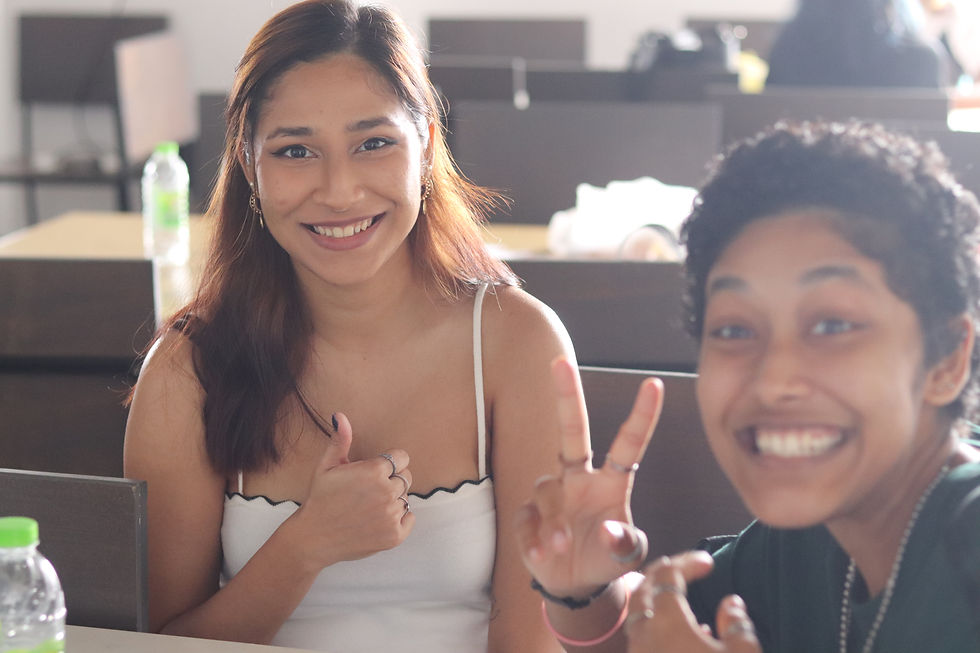Intervention 7 - Me in the Unfamiliar
- Tia Goonaratna

- Sep 7, 2022
- 4 min read
Updated: Nov 28, 2022
While I was figuring out ways of putting myself with a group of people that were unfamiliar to me, I came across an opportunity to conduct a workshop with the Academy of Design Foundation Programme.
After obtaining a consent to be a part of my research from AOD as well as the students, the first thing I established with them was that they have not seen me or heard of me before. In every other class I have taught, the former students would tell the newer students what kind of person I am. Most would meet me on the day of induction. This class has not met me nor heard of me before. I would usually have three semesets to establish my relationship with the students, but in this workshop, I would have three hours. Not only the students, but the staff that I was communicating with were also new to me.
I prepared myself by designing the curriculum for the day, to teach Human Centred Design, exactly how *I* would do on any other day. Even though I was a guest, I wore the normal clothes I would on a normal day, and was mindful to be myself in vocabulary and mannerism - a little sarcasm, light swearing, and jokes about everything.

As the students have only known each other for about two weeks by now, this provided a great opportunity for them to get to know each other on an empathetic level as well.
The workshop began with me asking if anyone has to 'pee'. I use this as a ice breaker. Instead of saying 'If anyone needs the loo or bathroom' or 'No bathrooms break', I use the word 'pee'. This gets a chuckle from the class and the ice is broken.
Then I gave a short intro to me, set my rules:
'Few rules: don't talk when I'm talking else I'll throw whatever is around me at your head and I have decent aim! Two: you are in university, you are all adults. So you can use your phone - if you need to tell your brother what time to pick you, if you need to run away with your boyfriend but you want to get coffee before that, all are okay. HOWEVER, if your phone rings in class, the person next to you will answer, and if it's a text, we'll read it out loud. You can snack... just don't open a bloody rice and curry and call your friends to have an eating party'.
After taking them through the presentation with personal anecdotes, jokes, sarcasm, and a small break, I played the Line Game. This is influenced by an activity I saw in Freedom Writers (2007) where students are standing in two rows facing each other. I ask them a question such as 'Who has a sister?' and whoever has a sister step up to the line. I start with less intense questions and then move on to questions such as 'Do you genuingly think your parents like you?'. I do throw in less intense questions in the middle, stop to chat about something they're passionate about, but I don't ask awkward questions about emotional questions. They have the freedom whether they want to answer a question or how they want to answer. In some situations, they will take a step back even or only put one foot forward. At the end, I tell them to look around. I tell them that everyone has their own problems no matter how perfect someone's life looks on the outside, and the next time they want to gang up against one student, perhaps just ask them how their weekend was instead.

Next, I also incoporated the Questions Intervention into this. I used Let's Get Closer card pack at the end for them to break the ice a bit more and get to know one another. I paired them up with however I felt like and this time, I was simply picking them based on similar clothing, which they got involved with as well. I asked them to give me some feedback at the end about the session, and to reach out to me if they need to discuss anything else.




This intervention showed that there are certain attributes as a person that I bring to the table that puts the students at ease. The parts that I consciously brought into the session were: language that was relatable but not too simple, my body language that was not rigid (sitting on tables, getting up on chairs), and not being judgmental on serious stuff (Completely judged them on the games they play). In the feedback sessions, there is evidence that the simplicity of the way I explain things was received well and noted.
What I've taken from this is that I need to incorporate the 'me'-ness into my interventions more. If the way I interact and communicate can create a safe environment for people to receive communication from others and to comprehend it, then I need to incorporate that into the environment of my interventions.
Update:
Feedback given to AOD shared to me by admin.






Comments